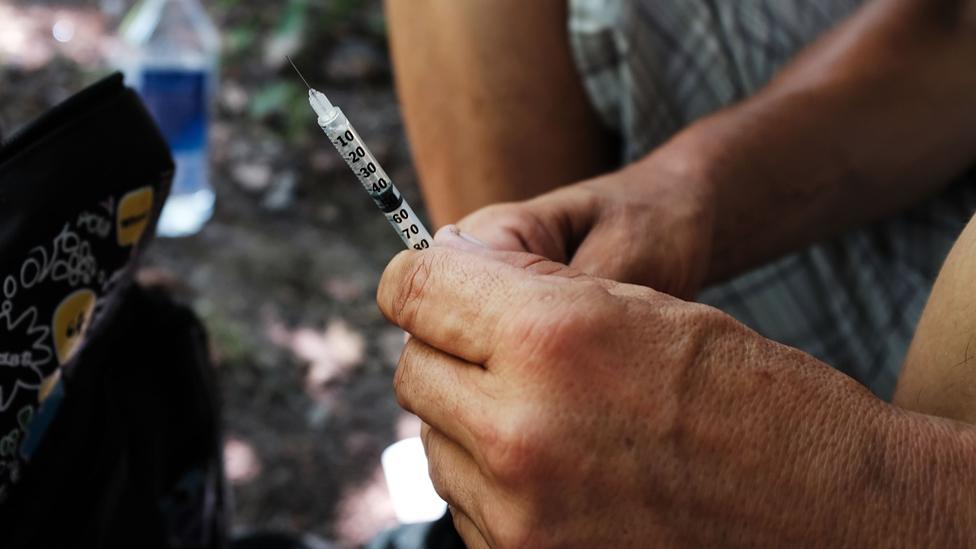Why are so many people denied the painkillers they need?
- Published
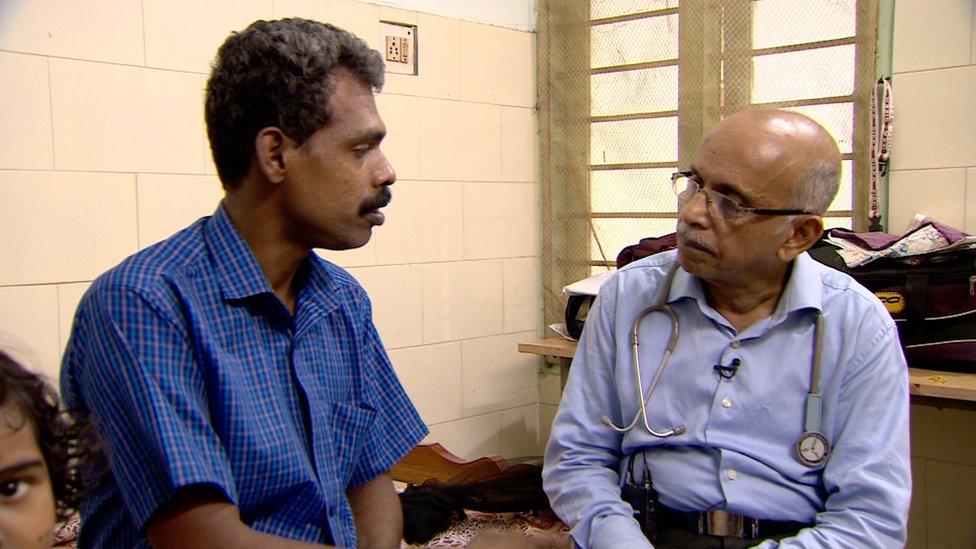
Dr MR Rajagopal, has been campaigning for decades to change the law to simplify the rules around opioids
The world is suffering from an invisible epidemic, an epidemic of pain.
As many as 60 million people are reckoned to suffer avoidable agony every year.
It is a situation that a visionary Indian doctor, Dr MR Rajagopal, has been campaigning to change for decades.
It isn't that the patients themselves are silent, he explains. Indeed, it was hearing the screams of agony of a neighbour in the last stages of cancer almost four decades ago that first set him on the path that would earn him his nickname: India's "father of palliative care".
"His family asked if I could help", he says, "and I couldn't, I was just a medical student."
It was his sense of helplessness in the face of that suffering that led him to specialise first as an anaesthetist, then in palliative care - the prevention and treatment of serious health-related suffering.
But after more than 30 years of activism, he acknowledges that most people's pain - not just in India but all around the world - is still ignored. That is why he describes pain as an "invisible" epidemic.
"If pain was infectious we would not have this issue," he says. "At the moment, pain is only a problem for those who suffer, for everyone else it is someone else's problem."
A key challenge is simply communicating the scale and horror of the suffering, Dr Rajagopal argues.
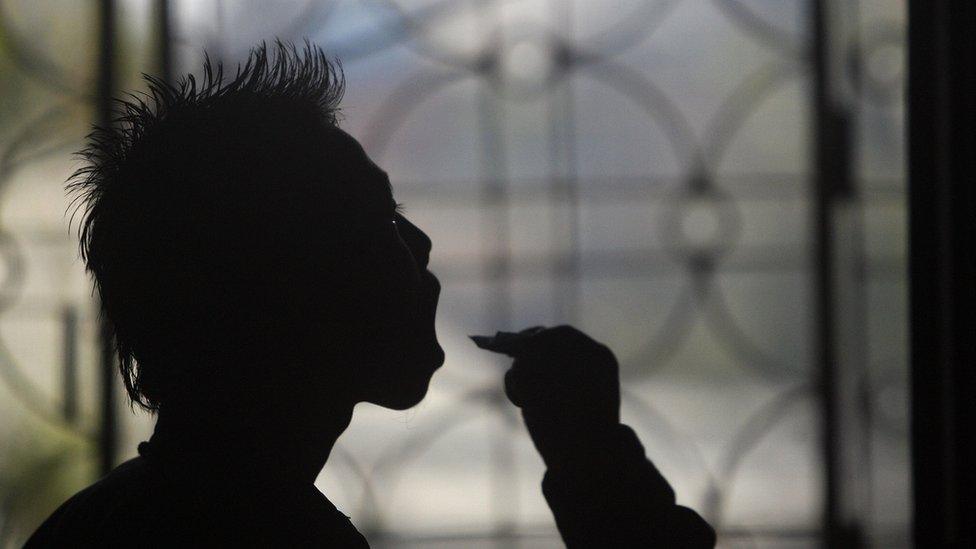
In India, it is rare for patients - even those in really severe pain - to receive opioids
"The merest schoolgirl when she falls in love has Shakespeare or Keats to speak her mind for her," wrote Virginia Woolf, "but let a sufferer try to describe a pain in his head to a doctor and language at once runs dry."
And if the discomforts of a headache cannot be shared by a writer as accomplished as Virginia Woolf, what of the acute agonies of cancer, asks Dr Rajagopal as we talk in a corridor in Pallium, the specialist palliative care hospital he runs in the south Indian state of Kerala.
"Most of us tend to judge pain by our own experience," he says. "We cannot fathom that pain can be beyond the power of your imagination. The depth of the agony people experience is unbelievable. We don't see it and the hospitals don't see it because doctors say there is nothing more we can do for you, go home."
He estimates that just 2% of Indians get adequate pain relief and a significant proportion of those that do are in Kerala which, thanks in large part to his efforts, has by far the most advanced pain relief services in India.
The root of the problem is simple, he says. Opioids - the cheapest and most effective pain killers - are too hard to get hold of in many countries, particularly developing nations.
Opioids are either derived from or based on the action of chemical compounds found in opium poppies. They stimulate receptors in the brain to produce a powerful pain-numbing effect. They also lessen anxiety and depression - common side effects of intense pain - but the sensation they induce can be euphoric and they are often abused. Opioids are also very addictive.
The so-called war on drugs the world has been waging for decades is designed to address the risks of abuse and addiction of these and other drugs by restricting supply.
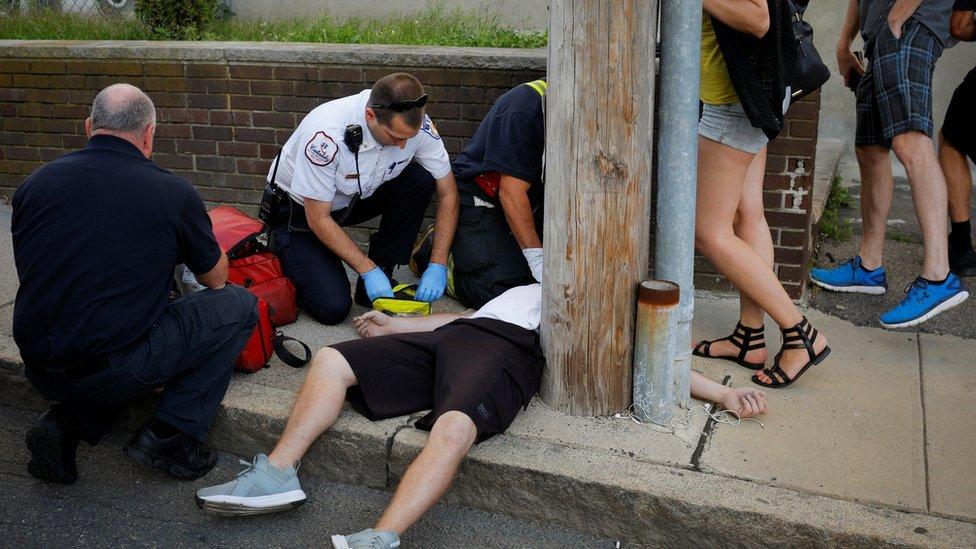
Over-prescription of opioid pain killers in the US has created rampant drug abuse
The problem, argues Dr Rajagopal and many others, is that in many countries, particularly low-income nations including India, the restrictions have gone too far.
A giddying "abyss" of inequality of access to pain relief has grown between rich and poor countries, concludes a recent study in the medical journal, the Lancet, external.
The report finds that of the almost 300 metric tonnes of morphine-equivalent opioids distributed in the world each year, a paltry 0.1 metric tonne reaches low-income countries.
"That access to such an inexpensive, essential, and effective intervention is denied to most patients in low and middle income countries," the study concludes, "is a medical, public health and moral failing and a travesty of justice."
This is not the kind of language you usually find in learned medical journals.
Just like the authors of the Lancet study, Dr Rajagopal is angry at the forest of restrictions countries like India have been encouraged to impose on opioids.
"Put it like this," he says with a wry laugh, "if you leave your home you want to have a good lock on the front door and you keep the key in your pocket. You don't put five locks on and then give the keys to five different people because that way you'll never get back in."
In India, hospitals were required to have five separate licences if they wanted to hold even the most basic opioid medicines. Doctors could be prosecuted for any error on a prescription even if it didn't lead to misuse of drugs.
With such strict rules and tough penalties, it became very rare for patients, even those in really severe pain, to receive opioids.
There has been progress. Back in 2014, Dr Rajagopal and others succeeded in persuading the national government to change the law to simplify the rules around opioids. New rules on prescription and storage of the drugs were introduced in 2015, yet he admits there has been very little increase in their use.
The problem, he says, is that reform stalled as the world became increasingly aware of the scale of the opioid crisis that is unfolding in America.
Over-prescription of opioid pain killers in the US has created such rampant abuse that more people now die of opioid overdoses than in car accidents.
There has been a lot of criticism of the way that pharmaceutical companies marketed opioids in America, downplaying the risks of addiction, but what is often forgotten is that a key impetus was a desire by doctors to treat pain.
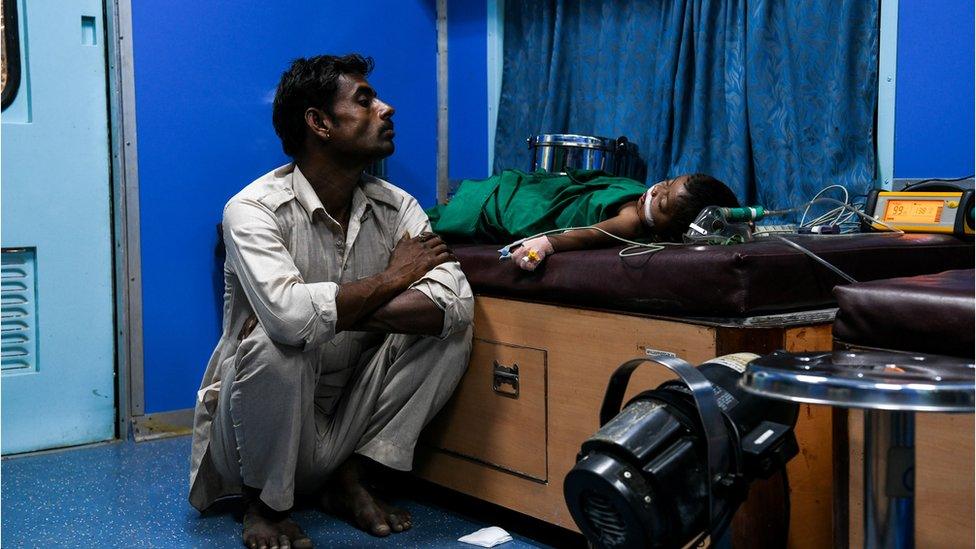
Despite the "invisibility" of the issue, pain is something we should all be concerned about
Just like Dr Rajagopal in India, the palliative care movement in the US in the 1990s argued that doctors were allowing a huge amount of suffering to go untreated. Pain was dubbed the "fifth vital sign", along with body temperature, pulse, respiration rate and blood pressure.
Dr Rajagopal is clearly frustrated by the way the international debate about how pain should be managed has been hijacked by the experience of the US.
"The basic precautions were not taken in the US", he argues, "and yet the whole world now looks to the US because what is happening there is so sensational."
Yet there are many examples of successful opioid regulation. "We have the UK, or France or Germany", he says, "where a balance has been achieved. They have shown - and we have shown even here in tiny Kerala - that we can make opioids available with reasonable ease and with adequate precautions while at the same time preventing inappropriate use or non-medical use."
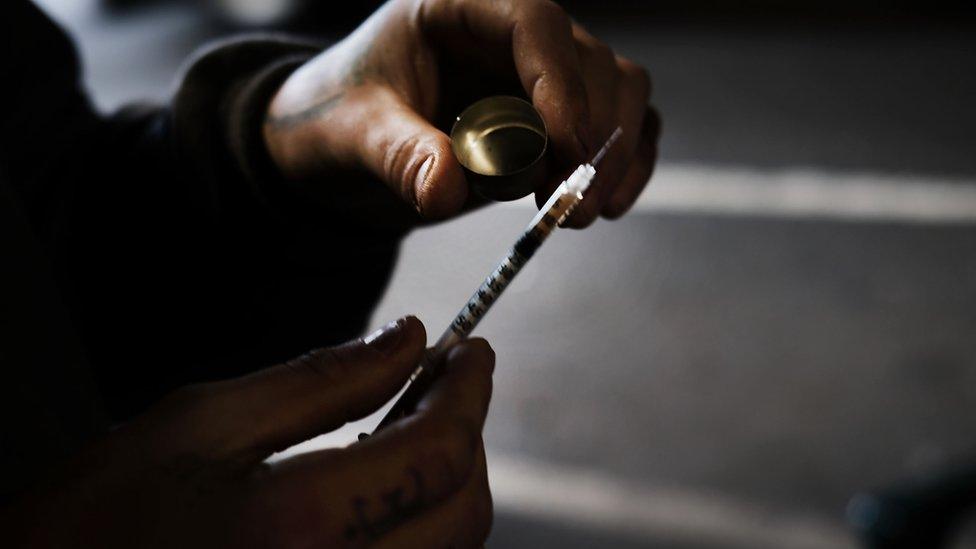
The basic precautions around opioid use were not taken in the US
He acknowledges changing attitudes will take time, not least because pain management is rarely mentioned during medical training in India and many other countries. As a result many doctors are anxious about prescribing opioids safely.
Dr Rajagopal is now in his seventies but has no plans to stop campaigning. "We know how to treat pain," he says. "What is needed now is advocacy on behalf of those who suffer."
"Those in pain cannot raise their voice because they have been so weakened in body and spirit, and there is no association of the dead to talk to ministers about the injustices that have been meted out to them."
Despite the "invisibility" of the issue, pain is something we should all be concerned about, he says.
We ignore this "sea of suffering" at our own peril. "Don't wait until it happens to you", he warns, "because then it'll be too late."
- Published19 March 2018
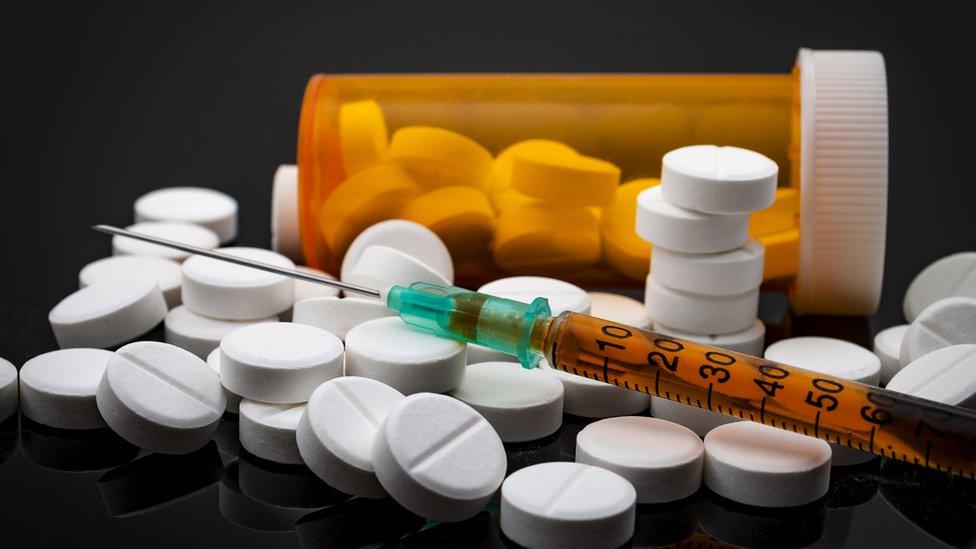
- Published22 February 2018
- Published6 August 2017
